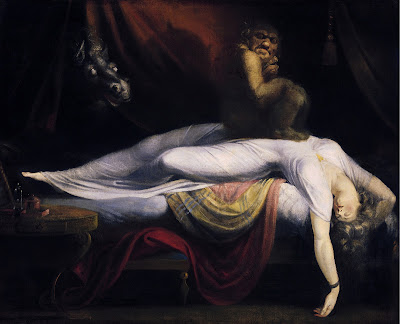 |
Get this lesson
and other lessons
from my TpT store. |
In this post, I re-package a previous post I did on Nietzsche's concept of eternal recurrence and turn it into a meaningful High School English lesson for Ninth and Tenth graders.
 |
| The demon on your chest — would you curse the demon or embrace your fate? |
A while ago, I posted a passage from Friedrich Nietzsche's book The Gay Science on my website. I was really struck by a section of the book I call "The Allegory of the Demon." It's a thought experiment and Nietzsche has his reader think about how does one live out their life? How would you live your life differently? What if you had to repeat your life over and over again without change? Would you "gnash your teeth" or would you embrace it?
I thought the passage was dense enough and short enough, to elicit a response in my Ninth and Tenth grade English classes. So, I created a lesson to think about Nietzsche along with a classic 1990s movie — Groundhog Day. None of my students had heard of the movie, and their knowledge of Nietzsche was slim — but we dug into the reading and I was pleasantly surprised by how much critical thinking we were able to do with such a small passage from World Literature. So. I put together the lesson on Teachers Pay Teachers. Here is the outline of the lesson:
Philosophy in the Classroom Lesson Plan: Nietzsche and Bill Murray in Groundhog Day
What is the meaning of life? You and your students are sure to come up with many answers to this question. Get your students engaged in philosophical inquiry by presenting them with Friedrich Nietzsche's concept of "eternal recurrence," paired with clips from the movie Groundhog Day (1993) starring Billy Murray and Andie McDowell.
This resource includes the following features:
Essential Question: What is the meaning of Life?
Supporting Questions: How does Friedrich Nietzsche provide a possible answer to this question. / How can I apply abstract ideas to everyday life?
This resource includes the following features:
The text of the story is included in this resource.
- Teacher's notes on using this resource
- 7 reading comprehension questions
- 1 Entrance Ticket
- 1 Movie View Guide
- 1 Writing Prompt
- 3 Editable Google Slides handouts
- Further Reading List (To go deeper into the topic with your students)
Suggested Uses:
- Ninth or Tenth Grade High School English Curriculum
- World History Course on the History of Ideas
- Introduction to Philosophy Course
- Literature Course
- Ethics Course
- Introduction to Philosophy Course
- Student Advisory Course
- A Lesson on the "Meaning of Life"
Suggested Classroom Time: 3 Hours + Independent Worktime for Students' writing








